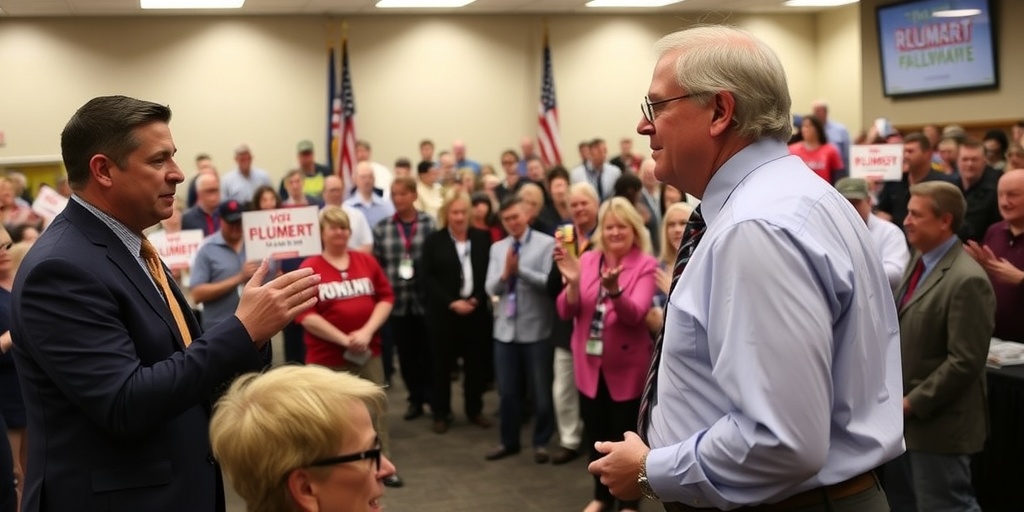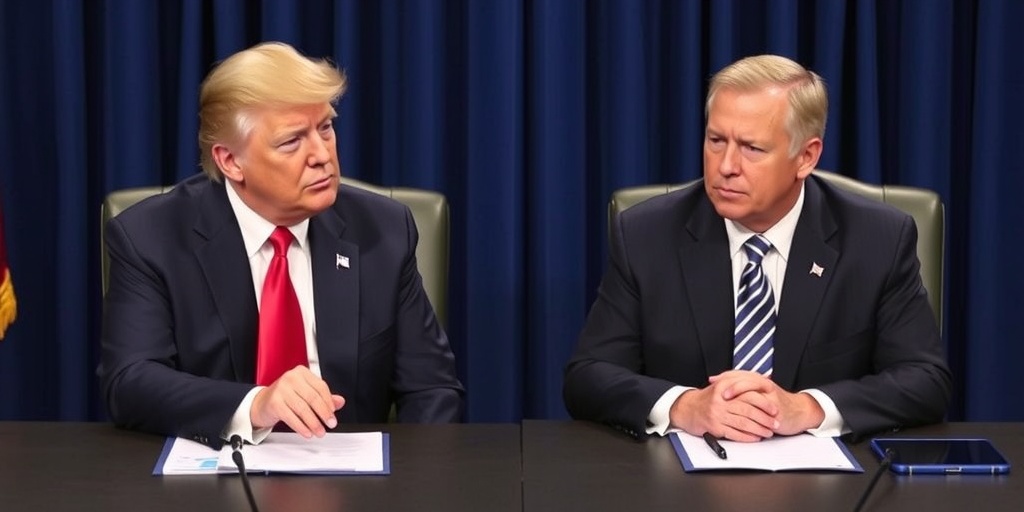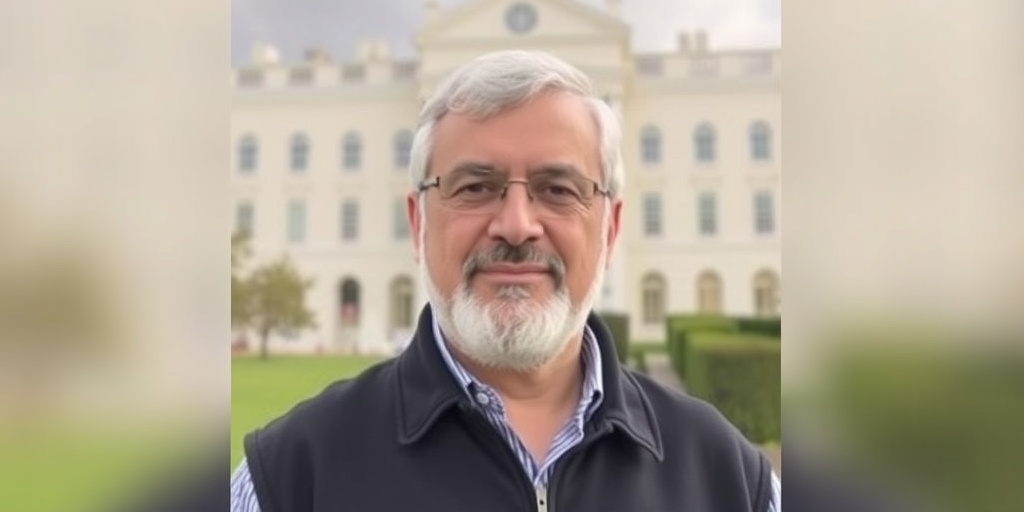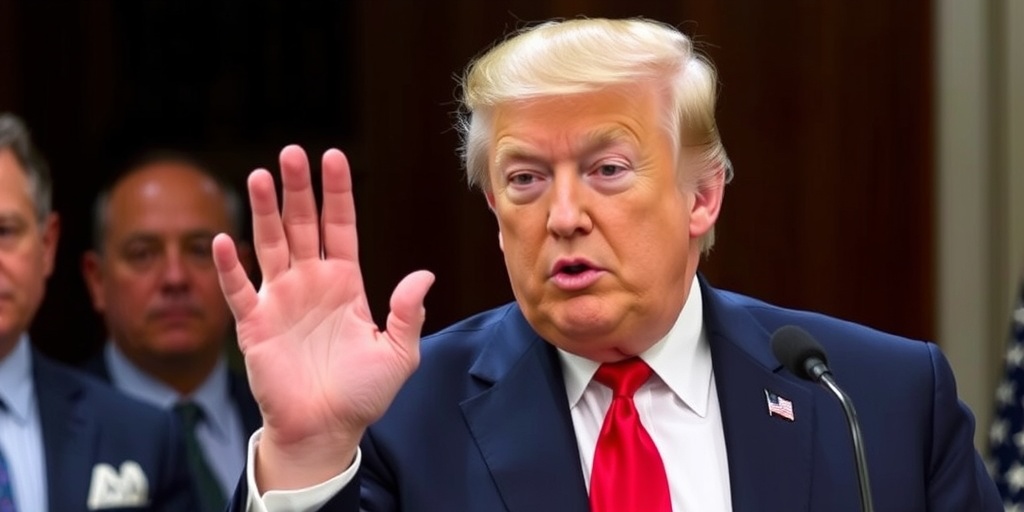Now Reading: Republicans Encounter Heated Voter backlash at Town Halls
-
01
Republicans Encounter Heated Voter backlash at Town Halls
Republicans Encounter Heated Voter backlash at Town Halls

Title: Republican Lawmakers Face Pushback from Constituents Over Trump’s Agenda
In a recent series of town hall meetings across the country, Republican lawmakers encountered significant pushback from constituents concerned about the impact of President Trump’s policies, especially in the wake of actions supported by billionaire Elon Musk. The frustrations voiced by constituents highlighted worries over government bureaucracy, potential cuts to social safety nets, and the perceived overreach of executive power.
Representative Pete Sessions, a seasoned Republican from Texas, attended a town hall in Trinity, a small rural community, expecting to deliver a standard update. However, he was met with a torrent of discontent as constituents directed pointed questions at him regarding Trump’s agenda. They pressed Sessions on the need for Congress to reclaim its constitutional authority, a sentiment expressed fervently by local lawyer Debra Norris, who questioned the legality of Musk’s mass layoffs and agency closures. “The executive can only enforce laws passed by Congress; they cannot make laws,” she argued, insisting that it is the responsibility of representatives like Sessions to wrest control back from the executive.
The atmosphere in Trinity mirrored similar scenes reported in other congressional districts across the nation as lawmakers returned home for their first recess since Trump’s inauguration. In Georgia, Representative Rich McCormick was met with jeers and shouts as he attempted to address questions regarding Musk’s access to government information, while in Wisconsin, Representative Scott Fitzgerald faced constituents demanding clarity on potential budget cuts that could affect essential services.
These confrontations bore resemblance to town hall meetings in 2009 that marked the rise of the Tea Party movement, where constituents fiercely protested against then-President Barack Obama’s health care policies. While it’s uncertain whether the backlash against Trump will mirror the intensity of that era, the growing dissatisfaction among voters suggests that their initial support for the new Republican majority may be waning as they begin to confront the real-world implications of the administration’s policies.
Despite the lively debates, there were still constituents expressing support for some of Trump’s policies. Sessions himself appeared unfazed by the confrontational tone of the meeting, even joking with the audience. Several attendees applauded his endorsement of an executive order barring transgender women from participating in female school sports, showing the complex dynamics within the Republican base.
Louis Smith, a local veteran, offered a measured critique of the administration’s messaging, suggesting that while he supported efforts to reduce government spending, the approach and communication strategies needed improvement. “The guy in South Africa is not doing you any good — he’s hurting you more than he’s helping,” Smith remarked, referring to Musk’s controversial influence.
Sessions found himself navigating a difficult line when pressed on Social Security during the meeting. When John Watt, the chairman of the Democratic Party in a nearby county, sought assurances that Trump would not target Social Security for budget cuts, Sessions refrained from offering guarantees, asserting that he could not promise the entitlement program would be safeguarded. Instead, he indicated support for conducting a comprehensive audit of the program, which may yield some cuts—a far cry from Trump’s past campaign promises to shield it from reductions.
The round of town halls has brought to light the delicate position Republican lawmakers find themselves in as they grapple with Trump’s ambitious agenda and its ramifications within their own districts. With midterm elections approaching, the potential for voter backlash poses a critical challenge, particularly in solidly Republican areas that may now be questioning their representatives’ alignment with Trump’s controversial policies.
Amid the public dissent, Trump’s own rhetoric remains defiant. In a recent social media post, he commended Musk’s efforts while simultaneously urging him to adopt a more aggressive approach. Musk responded to the backlash with emails sent to federal employees demanding accountability for their work, further amplifying tensions surrounding his administration’s agenda.
As the political landscape continues to evolve, sessions such as the one in Trinity reflect a growing disenchantment among voters who are increasingly aware of the potential consequences of Trump’s executive actions and the broader implications for federal governance. Lawmakers like Sessions stress the importance of open dialogue with their constituents, emphasizing a commitment to engage with voters regardless of their disagreements on policy matters.
“I heard them and they heard me,” Sessions remarked after the heated exchange, suggesting that despite the challenging conversations, he would remain resolute in holding more such forums to address constituent concerns directly. As the weeks ahead unfold, the GOP’s ability to navigate this unrest and respond to the demands of their voters will likely shape not just the legislative agenda but also the party’s standing leading into the upcoming midterm elections.
Stay Informed With the Latest & Most Important News
Previous Post
Next Post
-
 01New technology breakthrough has everyone talking right now
01New technology breakthrough has everyone talking right now -
 02Unbelievable life hack everyone needs to try today
02Unbelievable life hack everyone needs to try today -
 03Fascinating discovery found buried deep beneath the ocean
03Fascinating discovery found buried deep beneath the ocean -
 04Man invents genius device that solves everyday problems
04Man invents genius device that solves everyday problems -
 05Shocking discovery that changes what we know forever
05Shocking discovery that changes what we know forever -
 06Internet goes wild over celebrity’s unexpected fashion choice
06Internet goes wild over celebrity’s unexpected fashion choice -
 07Rare animal sighting stuns scientists and wildlife lovers
07Rare animal sighting stuns scientists and wildlife lovers





















